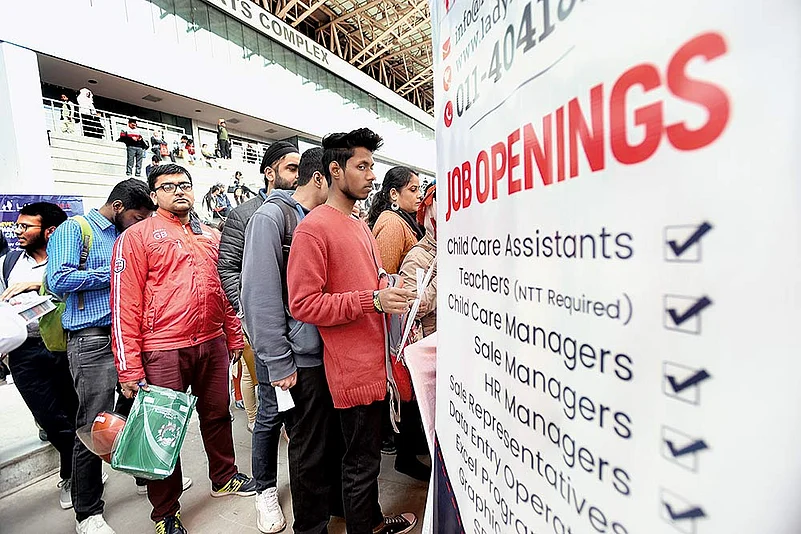Basavaraj, a cab driver in Bangalore, used to work on the electrical maintenance team at a business park for a few years before a family circumstance forced him to take over the app-based taxi from his brother to keep the car’s EMIs going. Earnings from driving radio cabs are not what they were three years ago but Basavaraj reckons he won’t go back to the job he had trained for. From his village alone near Bagalkot, around 500 kms to the north, there are about 10 people driving cabs here, he says.
Bangalore, naturally, attracts job-seekers from the less-developed northern region of Karnataka besides migrants from other states. Over the decades, the city’s employment scenario too has transformed. For instance, small-scale manufacturing—which once thrived on orders from public sector units and provided employment to an unskilled/semi-skilled first generation workforce—has shrunk over the past few decades. Then, there’s a growing gig economy. The trend in the tech-hub over the past decade or so, says Supriya Roychowdhury, professor at the Institute for Social and Economic Change (ISEC), is that the unskilled and semi-skilled labour force is going into the lower rungs of the services sector which is irregular and contract-based. Security services, for instance. “The diversity is very glaring. You can be earning as much as Rs 12-18,000 with PF and uniforms if you are working via an agency for a large company, or earning as low as Rs 4,000-5,000 with nothing else if you are a security person in a small apartment complex in a middle-to-low range neighbourhood,” she says.
Roychowdhury, in collaboration with National Institute of Advanced Studies, is currently working on a project on skills and livelihood, especially looking at the 3-4 month free training courses offered by various agencies. “Urban youth, mostly found in slums or economically weaker sections, are completely disinterested in these kinds of skill training centres because they are aware of the kind of employment that they are likely to find at the end of the training, which is unregulated, low pay, no security of employment, long hours of work and so on,” she says. Many, she says, prefer working as delivery boys for app-based services even though incomes may be low. “They qualify for it because they often have a two wheeler which is one of the most commonly-owned assets,” she says. “They control their own work and it gives them a kind of window into an upper class life which they normally wouldn’t have if they were working in a factory or elsewhere,” she says.
Karnataka is well below the Indian average on unemployment but there have been campaigns for better jobs and job security, especially in the run-up to state elections in 2018. “It was much more from contract workers and people who already had jobs, but of a precarious kind,” says Amit Basole of Azim Premji University whose report ‘State of Working India 2018’, published last September, noted that India’s higher GDP growth over the last decade has raised aspirations but has failed to generate the kind of jobs that will allow people to fulfill those aspirations. “Under-employment is a huge problem even in Bangalore,” says Vinay Sreenivasa of Alternative Law Forum, who works with the street vendors union. He cites the example of some youngsters from the districts taking up street vending even though they were graduates. “Of course, it’s a dignified job. But they didn’t go to college thinking they would sell food on the street.”
Bangalore’s garment industry, researchers say, has largely bucked the trend in manufacturing. There are around four lakh workers employed in the formal sector—among Indian states, Karnataka has the highest number of factory employees in the garment industry and Bangalore has the largest concentration of these factories. But attrition levels have always been high, notes Roychowdhury. “Many leave because they can’t withstand the pressure. So there is always a complaint from employers about labour shortage.”
Ajay Sukumaran in Bangalore


























